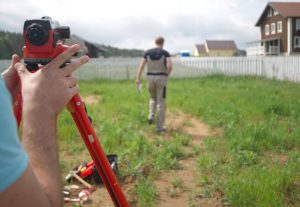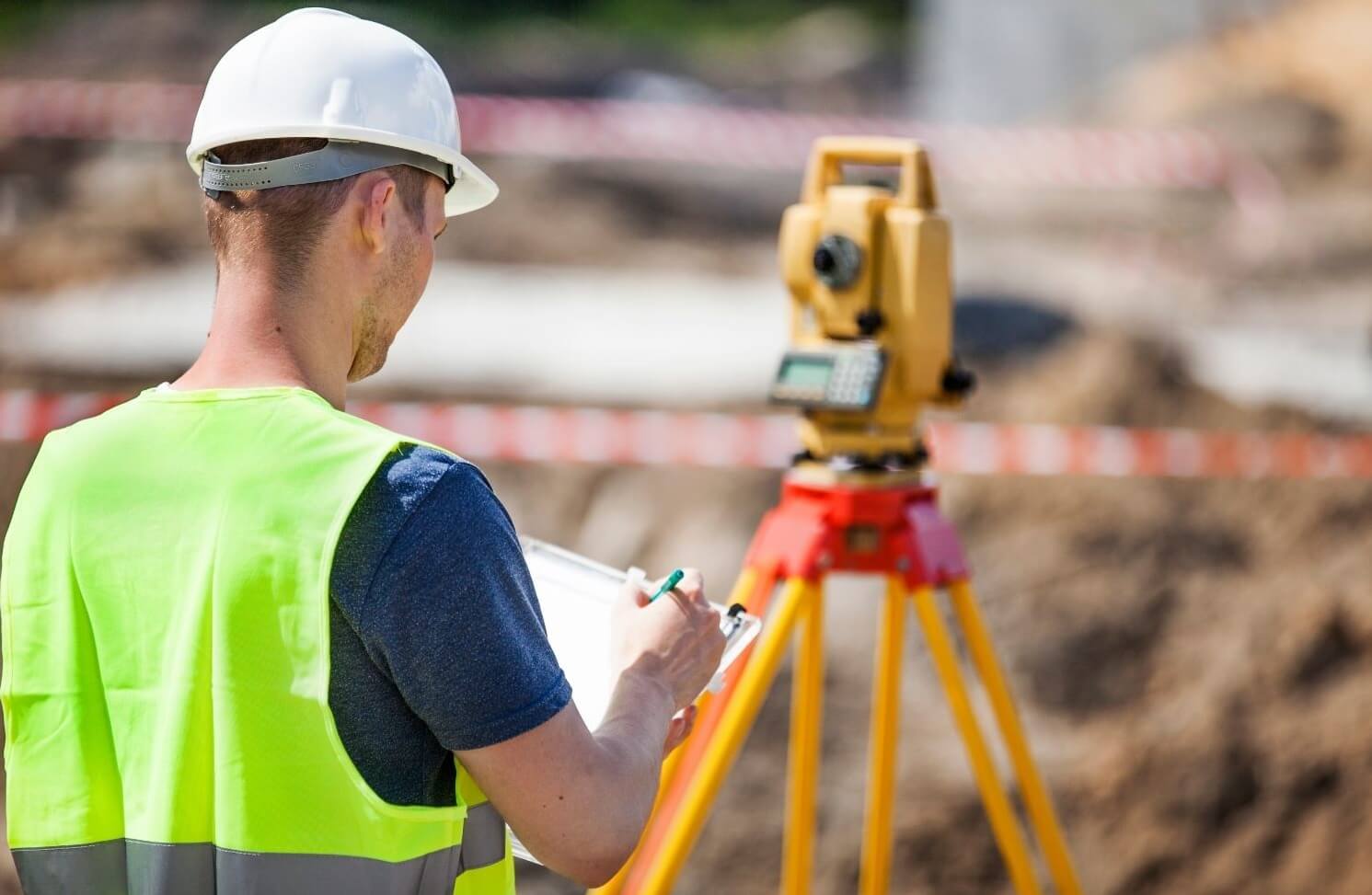What Are the Main Types of Land Surveyors?
In the UK, in particular, to become a land surveyor involves a sequence of education, work experience, and professional accreditation. Land surveyors have an important role in planning, developing and managing land, construction and infrastructure projects. There are different types of land surveyors specialising in different areas of land measurement and analysis:
- Topographic Surveyor: Topographic surveyors measure the natural and man-made features of a land’s landscape and map them on a larger scale. Topographic surveys produce maps showing the contours and elevation of land, which are used to plan and create engineered landscapes.
- Boundary Surveyor: Boundary surveys determine exact property lines of ownership. Boundary surveyors use measurements and historical property ownership records to mark the lines defining who owns what.
- Construction Surveyor: Surveyors measure and map building and infrastructure sites to create detailed drawings that guide construction. They are responsible for ensuring that buildings are built to specifications.
- Geodetic Surveyor: Geodetic Surveying Measures large portions of the Earth’s surface in great detail, typically for mapping or navigation. Geodetic surveyors use sophisticated equipment such as the Global Positioning System (GPS) and satellite systems to measure the Earth’s curvature and make precise measurements.
- Hydrographic Surveyor: This person measures seas, lakes, rivers, and coastlines, as well as markers on the sea bed and land masses above the water—work that is crucial for navigation, flood management, and environmental protection.
- Engineering Surveyor: These surveyors work with engineers on construction projects such as highways, bridges, tunnels, and other structures, measuring to ensure that these projects remain safe and are built in the proper place.
- Mining Surveyor: A mining surveyor works in the mining industry, measuring and mapping underground or surface mining areas for mineral extraction. They play an important role in ensuring mines are developed safely and profitably.

What Does a Land Surveyor Do?
To become a land surveyor, you use various equipment and techniques to measure and map the Earth’s surface for vital land development, property ownership, construction and environmental safety. Here’s an overview of a land surveyor’s most important job responsibilities.
- Take Surveys: To become a land surveyor, you measure properties, coasts, and other land. They collect data using GPS, laser scanners, and traditional measuring tools.
- Interpret the data: To become a land surveyor, you interpret the data they collect to create maps, plans or models. They calculate distances, angles, and elevations to accurately represent the land or site they are working on.
- Mark Property Boundaries: Perhaps the most common reason to call a land surveyor is to find out where exactly your and your neighbour’s properties end and begin (especially handy for land ownership disputes, real estate transactions and the construction of driveways, decks, fences and other structures).
- Prepare reports, maps, and plans: After conducting surveys, land surveyors prepare reports, maps, and plans that depict the results of their measurements. These are used by architects, engineers, developers, and lawyers.
- Consult with Engineers and Architects: To become a land surveyor, you often work with engineers, architects, and construction teams to help plan and construct buildings, roads and infrastructure projects.
- Make Sure All Regulations Are Followed: Surveying must be completed per local laws and regulations. Surveyors often work on projects or sites requiring a permit or certain zoning requirements.
- Use new technology and software: To become a land surveyor, you use global positioning systems (GPS), laser measuring devices, drones, and computer-aided design (CAD) software in the field to accomplish their work. They are expected to stay on top of the latest technology and tools used in land surveying.

Average Land Surveyor Salary
A land surveyor’s salary varies depending on experience, locality, and the nature of the projects they are working on. To become a land surveyor with experience in larger cities or large development projects tend to earn more than less experienced ones or those involved in small projects. Below is an overview of the typical salaries of land surveyors.
- Entry-Level Land Surveyor: At the bottom of the pay scale, entry-level land surveyors can anticipate earning between £20,000 and £30,000 a year.
- Highly experienced Land Surveyor: With years of experience, working as a land surveyor typically results in a yearly income of between £30,000 and £45,000.
- Senior land surveyor: Senior land surveyors or those on major projects can earn £45,000 to £60,000+.
Land Surveyor Skills
To be a good land surveyor, you need to have good technical and mathematical knowledge, good field skills, and interpersonal and problem-solving skills. The following is a list of the main skills required in the profession of a land surveyor.
- Maths and geometry: surveyors extensively use advanced mathematics, including geometry and trigonometry, to calculate distances, angles and elevations. You need good number skills.
- Attention to Detail: Surveyors must pay attention to details to land a survey precisely.
- Technical Skills: Surveyors must be able to use global positioning systems (GPS), laser measuring instruments, unmanned aerial systems (drones) and computer-aided design (CAD) software. They must be able to use technology.
- Problem-solving skills: It is the nature of the work that a land surveyor encounters problems in the field, such as the roughness of the terrain or conflicts in the land records. So, they need strong problem-solving skills to solve the problem and arrive at the correct version of what they want to accomplish.
- Physical Stamina: To become a land surveyor, you will spend much time outside, sometimes in adverse weather and difficult terrain. Physical stamina and environmental capability are important characteristics.
- Communication Skills: To become a land surveyor, you must communicate their findings to others who are not necessarily familiar with the technical details. These include architects, engineers and, of course, property owners. They must be able to present data verbally and in written reports.
- Legal Knowledge: To become a land surveyor, you must be familiar with property law, zoning requirements, and environmental regulations to ensure that their work complies with the law.

Land Surveyor Tips
Here are some practical tips for aspiring land surveyors:
- Gain Field Experience: To become a land surveyor, you need to gain field experience by taking an internship, apprenticeship, or entry-level position with a surveying firm.
- Keep Up With Technology: As with any career, survey techs are changing constantly. Know what the latest tools and software are out there. Familiarity with GPS, CAD, and drone technology is useful.
- Professional Accreditation: Many land surveyors seek accreditation with professional bodies such as the Royal Institution of Chartered Surveyors (RICS). This can demonstrate their skills, making them more employable.
- Work on Communication Skills: To become a land surveyor, you work with all stakeholders, so communication is critical. You’ll need to be able to describe technical information and results in a way that people without a technical background can understand.
- Develop problem-solving skills: Much of surveying work relies on solving problems, such as reconciling conflicting land records or working in difficult terrain. Improve your problem-solving skills to tackle the job better.
Land Surveyor Requirements
In the UK, in particular, becoming a land surveyor involves a sequence of education, work experience, and professional accreditation. Qualifications are important, and the more formal ones an applicant has, the better, but employers also regard hands-on experience highly. Here are the usual requirements for becoming a land surveyor:
- Degree or Diploma in Surveying or Geomatics: A degree or diploma in surveying or geomatics, or a related discipline such as civil engineering, that includes foundation coursework in land measurement, cartography, and GIS (Geographic Information Systems). Most surveyors have a degree or diploma in surveying, geomatics, or a related discipline such as civil engineering.
- Apprenticeships: Some trainee surveyors start as apprentices on surveying programmes that combine on-the-job work experience with academic training, so you earn the qualification while you work.
- Professional Accreditation: You can become professionally accredited by organisations such as the Royal Institution of Chartered Surveyors (RICS) or the Chartered Institution of Civil Engineering Surveyors (CICES). Accreditation shows your knowledge and experience in the profession.
- Relevant Work Experience: The best place to gain practical surveying experience is an internship, apprenticeship, or entry-level position. This can be the most critical element of a resume, as employers are looking for individuals who have worked in the field.

How to Become a Land Surveyor
Here’s a step-by-step guide to becoming a land surveyor in the UK:
- Get a Degree or Diploma: The first step is to get a degree or diploma in surveying, geomatics or a related field such as civil engineering or geography. The majority of post-secondary institutions now offer dedicated programmes in land surveying.
- Get Some Experience: Internships, apprenticeships, or entry-level work at surveying firms will help you get the on-the-job experience that all surveyors need.
- Professional Accreditation: After some experience, you might choose to gain professional accreditation, such as that offered by the Royal Institution of Chartered Surveyors (RICS) or the Chartered Institution of Civil Engineering Surveyors (CICES). This is especially helpful if you wish to become an employer or work on larger, more complex projects. Gathering experience and developing your professional skills can be both exciting and rewarding.
- Keep up with technology: Land surveying can use various tools and software, such as Global positioning systems (GPS), drones, and Computer-aided design (CAD) programs. Therefore, keeping up with the latest technology and tools in this field is important.
- Apply for Land Surveyor Jobs: Land surveyor jobs will be available for experienced construction, real estate, governmental agencies, and engineering firm personnel.
- Continue Learning and Specialising: Surveying is a profession with many specialisations. Continue learning and get certifications in the specialisation of your choice, such as geodetic surveying, hydrographic surveying, or boundary surveying.
Frequently Asked Questions
Why Should You Become a Land Surveyor?
A career as a land surveyor offers the opportunity to enjoy the outdoors, use advanced technology, and contribute to the construction, development and management of land. It’s a great career for anyone who likes a job with precise detail and intricate challenges. Surveying has many applications and uses, including construction, real estate, and environmental protection. The demand for surveyors is good and steady, which means job security and opportunities for specialisation. Compensation is competitive.
Is Being a Land Surveyor a Good Career Choice for You?
If you love working in maths and tech and can solve problems, you are a good candidate for a land surveying career. It’s a great career choice for people who are detail-oriented and enjoy the feeling of accomplishment that goes with working on projects that have a lasting effect on the development and management of land and property. You’ll also need to be comfortable with modern technology like GPS and CAD software and have a good knack for communicating with engineers, architects and property owners.
Land Surveyor Salaries
How much does a land surveyor earn in the UK? Salaries for land surveyors vary from £20,000 to £60,000+ depending on experience, location and type of work. Beginner land surveyors can expect to earn £20,000 to £30,000. Experienced land surveyors can earn £30,000 to £45,000. Senior land surveyors, or those working on large-scale infrastructure projects, can earn £60,000+.
Which Qualifications Can Help with a Career as a Land Surveyor?
A degree in surveying, geomatics, civil engineering or geography is necessary for most roles. However, professional accreditation with the Royal Institution of Chartered Surveyors (RICS) or the Chartered Institution of Civil Engineering Surveyors (CICES) is highly desirable (and often required for senior roles). A good working knowledge of software such as AutoCAD and GIS is also useful for progression.
Do I Need Experience to Get Started as a Land Surveyor?
Indeed, you can’t become a good land surveyor without gaining practical experience, typically acquired through internships, apprenticeships or entry-level employment with surveying or civil engineering companies. Such work provides you with the technical skills necessary for work in the field and from the office and experience in applying surveying principles to real-world projects.
Land Surveyor Career Outlook
The UK has a high demand for land surveyors, spurred by continued urbanisation, infrastructure expansion, and construction expansion. As cities expand and new infrastructures are put in place, land surveyors will be required to obtain precise measurements and data for development. Thanks to the digitisation of land surveying through drones, GPS, and geographic information systems (GIS), land surveying continues to evolve, with many opportunities ahead for those who can stay up to date with the latest technology.
Land Surveyor Hierarchy and Progressing Within the Role
Land surveyors may have these career levels, starting as Trainee Surveyors or Surveying Assistants and then moving into full Land Surveyor roles. Senior Land Surveyors can specialise as Geodetic or Hydrographic Surveying experts. From there, they may progress to Survey Manager, overseeing large projects, or Principal Surveyor or Chartered Surveyor, in charge of surveying departments or firms.
Land Surveyor Exit Options and Opportunities
There are several exit routes available to land surveyors. Some progress has been made to become specialists in surveying, moving into other areas such as geospatial analysis, environmental consultancy, and urban planning. Professionals can also move into related professions, including Civil Engineering, Real Estate Development and Construction Management. Surveyors with experience can also become self-employed consultants, offering services to a range of


